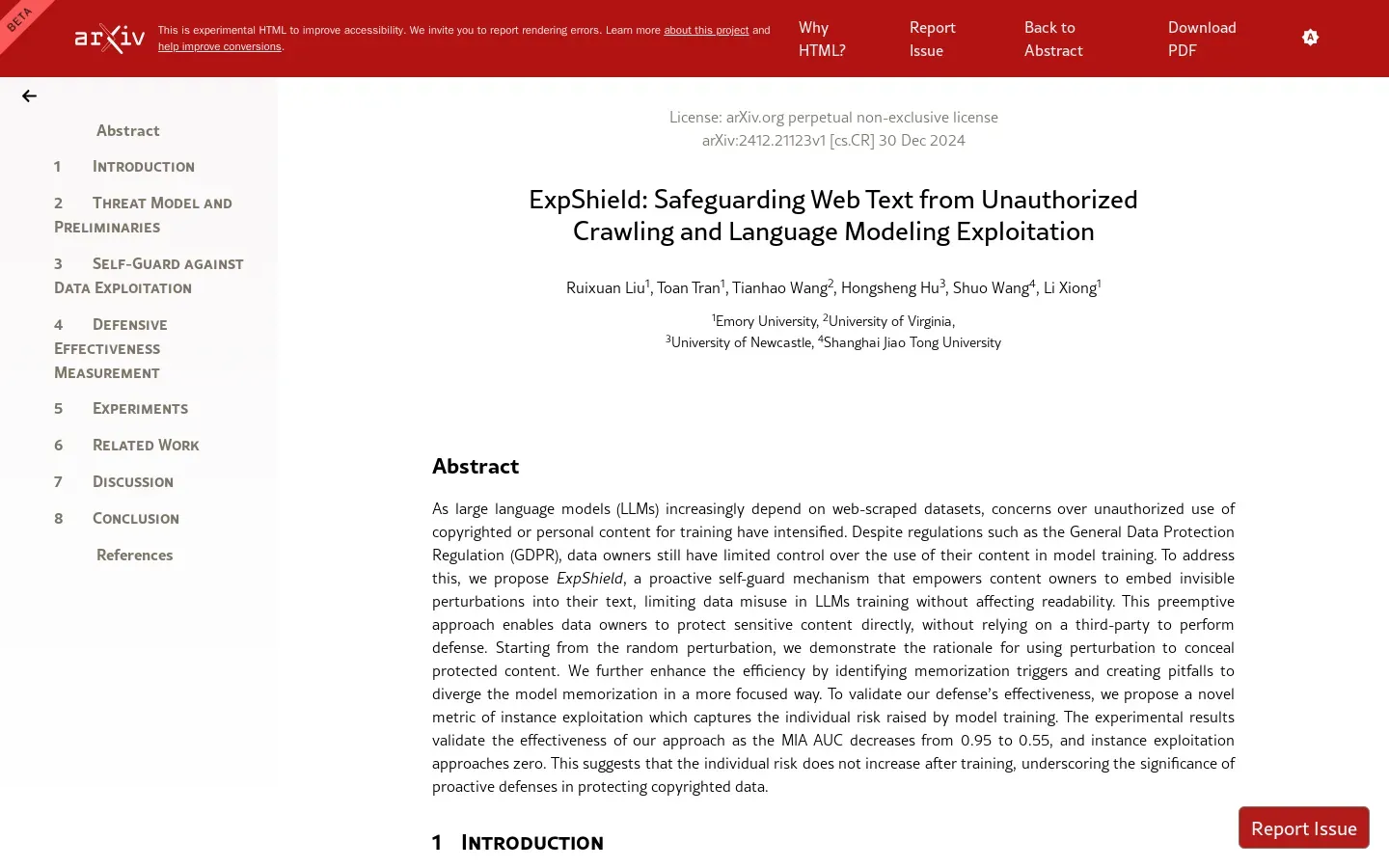
ExpShield Introduces Mechanism to Protect Copyrighted Content
/ 4 min read
Quick take - Recent research has introduced ExpShield, a proactive self-guard mechanism designed to protect copyrighted and sensitive information in large language models by identifying vulnerabilities and implementing advanced privacy protection strategies.
Fast Facts
-
Introduction of ExpShield: A new proactive self-guard mechanism designed to protect copyrighted and sensitive information in large language models (LLMs) amidst growing concerns over data privacy and copyright infringement.
-
Key Objectives: Focuses on identifying memorization triggers, creating pitfall tokens to prevent data leakage, evaluating privacy risks, and exploring optimization techniques to enhance data privacy.
-
Strengths of ExpShield: Offers a structured approach to identify vulnerabilities in LLMs, integrates advanced digital rights management (DRM) solutions, and emphasizes proactive cybersecurity measures for organizational defense.
-
Limitations and Future Research: Acknowledges the need for further investigation into privacy risks and the effectiveness of optimization techniques to fully understand and counteract potential threats.
-
Future Applications: ExpShield has potential applications in copyright protection, personal data management, and cybersecurity, positioning it as a vital tool for enhancing data privacy in an AI-driven landscape.
ExpShield: A New Frontier in Protecting Copyrighted Content in Language Models
In the rapidly evolving realm of artificial intelligence, safeguarding sensitive information has become a paramount concern. A recent research initiative has introduced ExpShield, a proactive self-guard mechanism designed to protect copyrighted content within large language models (LLMs). This development addresses pressing issues of data privacy and copyright infringement, underscoring the need for robust security measures in today’s digital age.
Understanding ExpShield’s Core Objectives
ExpShield’s research focuses on several critical areas. It aims to identify memorization triggers within LLMs, which are points where models inadvertently store and potentially expose sensitive data. To combat this, the study introduces “pitfall tokens,” designed to mitigate data leakage by confusing or misleading the model when it encounters copyrighted material. Additionally, the research evaluates privacy risks inherent in LLMs and explores optimization-based perturbation techniques to bolster data privacy. These efforts highlight the necessity of proactive strategies to protect copyrighted content during the extensive training processes of large-scale language models.
Key Findings and Strengths of ExpShield
The research highlights several strengths of the ExpShield mechanism. It offers a structured approach to pinpointing vulnerabilities in LLMs, allowing organizations to implement targeted protective measures effectively. The integration of advanced digital rights management (DRM) solutions and enhanced privacy protection strategies significantly strengthens the security framework surrounding personal data sharing. Furthermore, proactive cybersecurity measures are emphasized as essential components in fortifying organizational defenses against potential exploitation of sensitive information.
Limitations and Areas for Further Research
Despite its promising findings, the study acknowledges certain limitations. There is a need for further investigation into the empirical evaluation of privacy risks and the efficacy of proposed optimization-based perturbation techniques. Fully understanding the spectrum of potential threats and developing comprehensive strategies to counteract them will be crucial for the continued advancement of ExpShield and similar mechanisms.
Recommended Tools and Techniques
To complement the ExpShield approach, researchers advocate for adopting several tools and frameworks:
- Enhanced Digital Rights Management (DRM) Solutions: These are vital for managing and protecting copyrighted content.
- Privacy Protection in Personal Data Sharing: Ensuring sensitive information is safeguarded during exchanges is crucial.
- Proactive Cybersecurity Measures: Organizations should strengthen defenses against data breaches and unauthorized access.
- Development of AI Ethics and Compliance Tools: Aligning AI technologies with ethical standards and regulatory requirements is essential.
These strategies collectively contribute to enhancing data privacy within language modeling, providing a comprehensive framework for self-guarding sensitive information.
Future Directions and Applications
Looking forward, the research outlines several future directions for ExpShield. Its versatility makes it suitable for addressing various privacy and security challenges. Potential applications include improved frameworks for copyright protection in creative industries, enhanced privacy protocols for personal data management, and robust defenses against emerging cybersecurity threats. The adaptability of ExpShield positions it as a pivotal tool in the ongoing battle for data privacy and security in an increasingly interconnected and AI-driven world.
As cybersecurity landscapes continue to evolve, insights from this research will be instrumental in shaping future data protection strategies. The ExpShield initiative represents a significant step forward in proactive measures for safeguarding copyrighted content within large language models.



